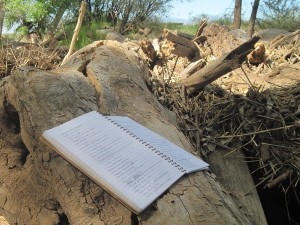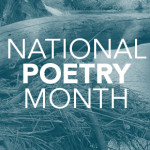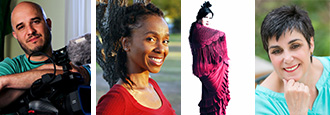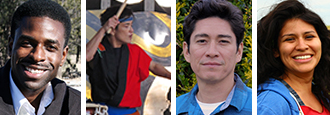“What sets my work apart and qualifies me for the Lines for Echolocation project is my practice of place-based writing as more than a matter of description, interpretation, meditation, or bearing witness. For me, place-based writing is a knowledge maker, a creator of new inquiry, and a creative research method in its own right.”
Wendy Burk is a recipient of a 2015 Artist Research & Development Grant.
Artist Research and Development Grants are designed to support the advancement of artistic research, aid in the development of artistic work and recognize the contributions individual artists make to Arizona’s communities. For more information about the Artist Research & Development Grant, click here.
 Wendy Burk’s Lines for Echolocation project uses lines of poetry as a bat uses blips of sonar: to investigate place through sound. Here, keystone sites in Southern Arizona—such as Tumamoc Hill, the Santa Rita Mountains and the Santa Cruz River—are the places of investigation, while the sounds are lines of poetry used as catalysts for improvised composition and performance.
Wendy Burk’s Lines for Echolocation project uses lines of poetry as a bat uses blips of sonar: to investigate place through sound. Here, keystone sites in Southern Arizona—such as Tumamoc Hill, the Santa Rita Mountains and the Santa Cruz River—are the places of investigation, while the sounds are lines of poetry used as catalysts for improvised composition and performance.
200 lines of original poetry function as springboard phrases for site-based poems composed in the field. Choosing lines from her cache at random, Burk crafts poems in response to place—handwriting them on paper as they occur to her in the field. These site-based exercises are participatory in nature; Burk invites other writers and artists to join her in the field and create their own work. The poems are presented to an audience in performances that each end with Burk giving the handwritten work to an audience member. In a final iteration, the lines are edited into a book-length manuscript, each line presented on its own page, surrounded by blank space. The introduction to this manuscript grants permission for any person to use any of the lines to create their own poems, performing them and publishing them as they wish.
Lines for Echolocation radically recasts the poet’s identity and role, particularly in relation to notions of place, sustainability, performance, and the archival record. As well, it advances an innovative form of sustainability by foregrounding language as a site for creative reuse. Every line and every word of the project is intended for reuse, whether Burk is reusing her lines to create multiple poems, or whether multiple poets are reusing Burk’s lines to generate their own creative work. Hypothetically, the project could generate an incalculable number of poems.
 Tucson, Arizona writer Wendy Burk is a poet and researcher who conducts site-based literary experiments—also known as poetic field research—to stretch the idea of what a poet is, and what a poet does. Burk received her BA in Creative Writing and Spanish from Brandeis University in 1997, later earning advanced degrees from the University of Arizona: an MFA in Creative Writing (1999) and an MA in Information Resources and Library Science (2012). Burk worked as an adjunct teacher of English, Creative Writing and Spanish at the University of Arizona and Pima Community College; as a freelance translator; and as an academic advisor of undergraduate students. She is currently the librarian at the University of Arizona Poetry Center, home to one of the largest collections of contemporary poetry in the United States.
Tucson, Arizona writer Wendy Burk is a poet and researcher who conducts site-based literary experiments—also known as poetic field research—to stretch the idea of what a poet is, and what a poet does. Burk received her BA in Creative Writing and Spanish from Brandeis University in 1997, later earning advanced degrees from the University of Arizona: an MFA in Creative Writing (1999) and an MA in Information Resources and Library Science (2012). Burk worked as an adjunct teacher of English, Creative Writing and Spanish at the University of Arizona and Pima Community College; as a freelance translator; and as an academic advisor of undergraduate students. She is currently the librarian at the University of Arizona Poetry Center, home to one of the largest collections of contemporary poetry in the United States.
Her publications include the poetry chapbooks The Place Names the Place Named (Fact-Simile Editions, 2010) and The Deer (Finishing Line Press, 2004), as well as translations of two publications by Mexican poet Tedi López Mills. She received the 2013 National Endowment for the Arts Literature Fellowship in Translation, three Pushcart Prize nominations, and has had more than 60 poems and translations published since 1999 in anthologies and literary journals, such as Tin House, Colorado Review, VOLT, Terrain, Asymptote, and Aufgabe. Residencies include Isle Royale National Park, Buffalo National River, Big Cypress National Preserve, and the Cabin at Shotpouch Creek. She has participated in several Southern Arizona literary performance collectives, including The Invisible City Project (2008), Tumamoc Hill Writing Project (2012–2013), and the Poetic Field Research Performance Weekend at Biosphere 2 (2014).
Wendy Burk and her Ecoholcation project were featured in the October 2015 issue of Tucson Lifestyle Magazine.
In May 2016, Phoneme Media published Against the Current, a book of poems by Mexican poet Tedi López Mills, translated by Burk from the original Spanish.

Perspectives: Wendy Burk
Perspectives is an on ongoing series of interviews and check-ins with recipients of our Artist Research and Development Grant (ARDG). Today we speak with 2015 ARDG recipient Wendy Burk of Tucson.
Read more
National Poetry Month 2016
In 1996, the Academy of American Poets established April as National Poetry Month. To celebrate the 20th Anniversary of this annual celebration of the poets and their work, the Arizona Commission on the Arts is throwing a spotlight on recent recipients of our Artist Research and Development Grant.
Read more





